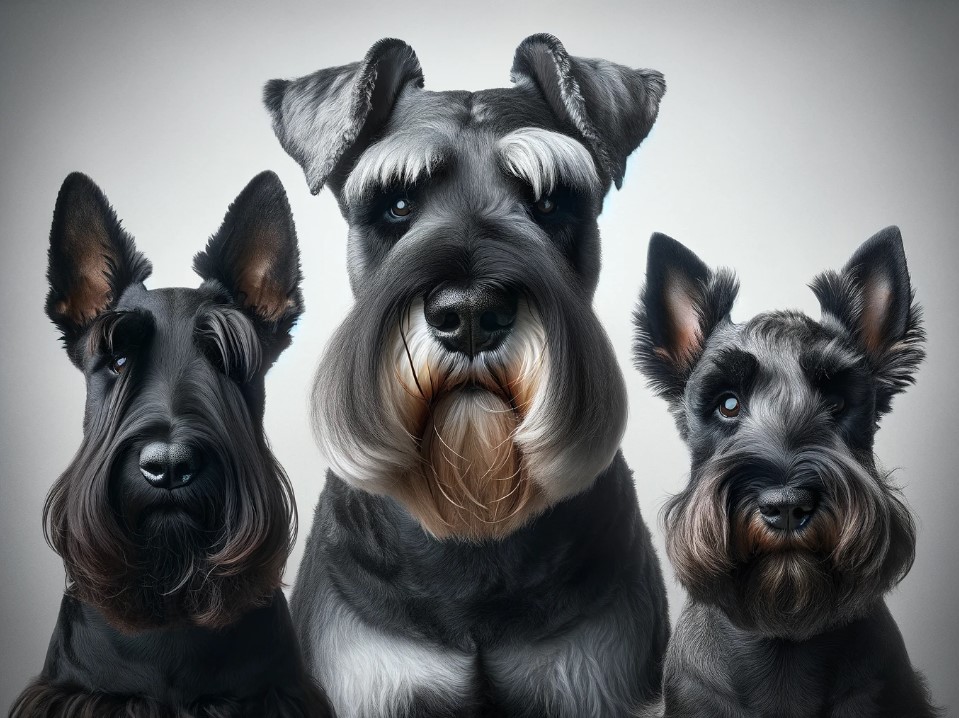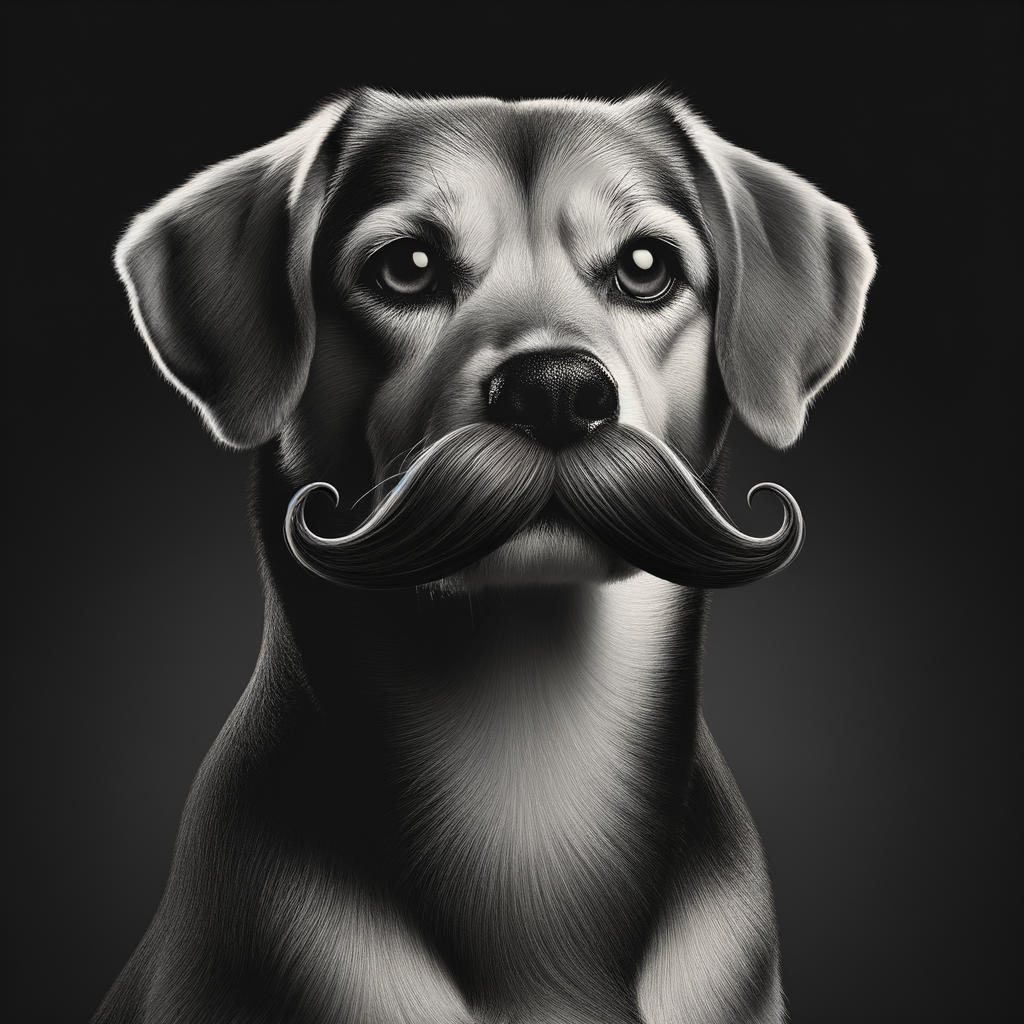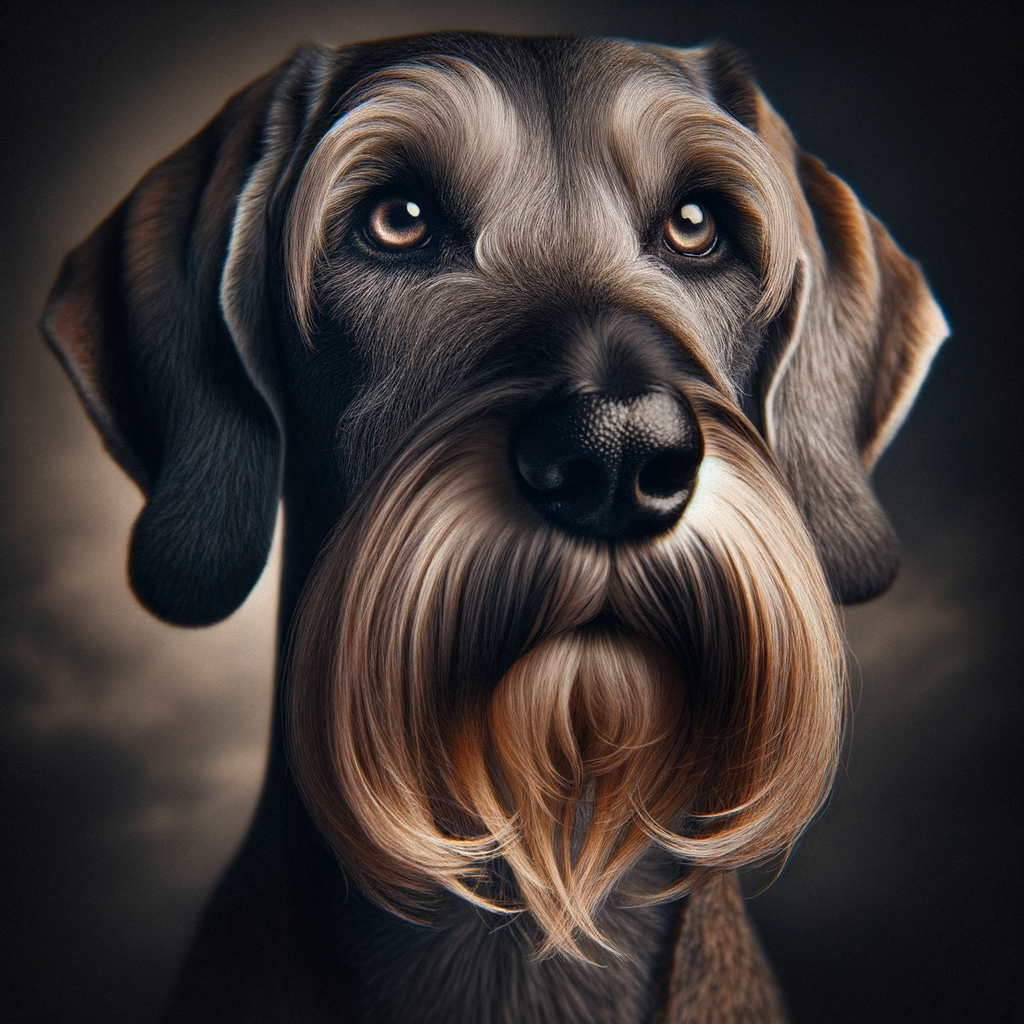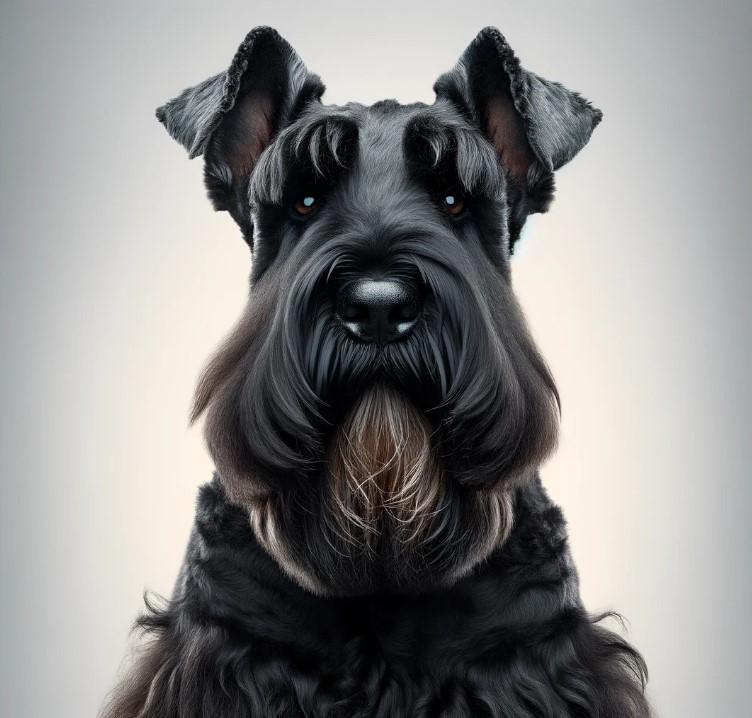As a seasoned vet and dog lover, I’ve had the pleasure of meeting all sorts of wonderful and unique breeds. But few are as charming and distinctive as our dog breeds with mustaches. Yes, you read that right – mustaches! These canines’ facial hair, from striking beards to dashing whiskers, adds an extra level of character and spunk to their already lovable personalities.

Many dog enthusiasts find these mustached breeds irresistible, and it’s not hard to see why. The combination of their expressive eyes with the unusual facial hair creates a unique appearance that’s both adorable and sophisticated. But did you know that the charming mustaches on these breeds are not just for show? These fascinating facial features are a key part of the genetic makeup that makes each breed unique.
Canine whiskers or mustaches, known scientifically as “vibrissae”, play vital roles in a dog’s sensory perception. They help canines sense changes in their surroundings, acting like nature’s radar system. Furthermore, the mustaches you see on specific breeds like the Schnauzer or Brussels Griffon aren’t just aesthetic features – they’re deeply ingrained in the breed’s DNA, passed down through generations of selective breeding.
While these distinctive facial features add to the appeal of these breeds, they also require extra grooming care. Hence, if you’re considering bringing a mustached breed into your home, it’s essential to understand how to maintain a healthy and clean mustache for your furry friend.
So, if you’ve ever been intrigued by a pooch with a perfectly groomed stache or a scruffy beard-like fur, you’re in for a treat. This article dives into the world of mustached dog breeds, exploring everything from their historical significance to tips for proper grooming and care. So, come along as we explore the whiskered wonders of the canine world.

Historical Significance of Mustached Dog Breeds
As you embark on an exploration of dog breeds with mustaches, get ready to venture back in time to discover the historical significance of these whiskered wonders! This journey promises not just knowledge, but fascinating tales and cultural insights that have shaped our perspective towards these unique breeds. So, why wait? Let’s dive into the rich tapestry that features our ever-adorable mustached canine companions!
Famous Mustached Dogs in History
Throughout history, there have been numerous famous mustached dogs that have captured our hearts. From the world of entertainment to the realm of politics, these dogs left an indelible mark with their distinctive facial hair and character.
- Greyfriars Bobby: A Skye Terrier, Bobby won hearts in 19th century Scotland with his loyalty and his signature mustache. He became a local legend for guarding his master’s grave for 14 years.
- Rin Tin Tin: Although not typically known for a mustache, Rin Tin Tin, a German Shepherd, sometimes sported a well-groomed one in his silver screen appearances during the 1920s, making him a trendsetter.
- Millie: As the pet of former US President George H.W. Bush, Millie, an English Springer Spaniel with a short, neat mustache, gained fame by “authoring” a book about her life in the White House.
These canines have played significant roles in popular culture and have further endeared dog breeds with mustaches to us. Their stories continue to inspire dog lovers worldwide.
Cultural Impact of Whiskered Canines
The cultural impact of mustached dog breeds is far-reaching, influencing art, folklore, and societal norms. In some cultures, mustached dogs symbolize wisdom, given the association of facial hair with maturity and intellect.
The Schnauzer, for instance, has an impressive ‘stache that is often associated with German culture. The breed’s name is derived from the German word “schnauze,” meaning “muzzle,” a clear reference to the breed’s distinctive facial hair. These dogs have been featured in art, literature, and even beer labels, becoming an icon of German heritage.
In a somewhat humorous twist, the annual World Beard and Mustache Championships has a category for ‘Best Dog with a Mustache’. Here, breeds like the Brussels Griffon, with their pronounced whiskers, enjoy their moment in the limelight, further cementing the cultural significance of mustached breeds.
The charm and character of dog breeds with mustaches have stood the test of time, not just as pets but as enduring symbols and delightful features of our shared cultural heritage. So, as you consider adding a whiskered companion to your family, remember, you’re embracing a piece of history that’s as fascinating as it is fuzzy!
Dog Breeds With Mustaches: The Whiskered Wonders of the Canine World
Top Mustached Dog Breeds
When it comes to the canine kingdom, variety is paramount. There are large breeds, small breeds, fluffy breeds, sleek breeds, and yes, mustached breeds. This article is dedicated to those unique, charming, and dapper dogs that sport prominent mustaches.
The Distinguished Schnauzer
Among the dog breeds with mustaches, few are as instantly recognizable as the Schnauzer. This breed comes in three sizes, but all share the trademark whiskers and mustache that give them a serious, yet whimsical appearance.
The Schnauzer’s mustache isn’t just for show, though. This facial hair helps protect the dog’s sensitive mouth area from the harsh elements, and also from any debris when they’re sniffing around outside. A Schnauzer’s mustache requires grooming to keep it looking clean and tidy. But trust me, the result is a distinguished looking companion that will definitely turn heads on your daily walks.
The Charismatic Brussels Griffon
Next up in our exploration of mustached dog breeds is the Brussels Griffon. This small breed boasts a significant mustache that complements its expressive, almost human-like face.
The Griffon’s mustache, combined with its unique facial structure and topknot (a tuft of hair on the head) lend it a distinctive appearance, often compared to a monkey. As a breed, the Brussels Griffon is known for its vivacious personality, matching its charismatic looks.
The Griffon’s mustache may require more grooming than other breeds. The fur around their mouth can get dirty quickly, especially after meals. Regular cleaning and grooming will keep your Griffon’s mustache looking its best and prevent any potential skin infections.
Both the Schnauzer and the Brussels Griffon represent the charm that comes with owning a mustached breed. These dogs, with their distinct facial hair, bring a unique flair to the diverse world of dog breeds. They require a bit of extra care in the grooming department, but for many, the added maintenance is a small price to pay for the joy and companionship these whiskered wonders provide.
In the end, the choice of breed should depend on your lifestyle, living conditions, and personal preference. But if you’re a fan of facial hair, consider one of these mustached breeds. They’re sure to bring a touch of whimsy and elegance to your life with their distinguished, quirky looks.
Grooming and Care for Mustached Breeds
When it comes to grooming your whiskered friend, there are some key things to keep in mind. Not only does regular grooming keep your pet looking dashing, but it also plays a critical role in their health and well-being.
Essential Grooming Tips for Maintaining a Healthy Mustache
Just like human hair, a dog’s mustache needs regular care. Here are some tips for keeping your dog’s mustache healthy and tidy:
- Brush Regularly: Use a small, soft-bristle brush to gently comb the mustache. This will help remove any food particles or dirt trapped in the hair, and keep it from matting. Brushing also stimulates the skin and hair follicles which promotes healthy growth.
- Trim Carefully: Regular trimming will keep the mustache looking neat and prevent it from blocking your dog’s vision. Always use specially designed pet grooming scissors and be careful not to cut too close to the skin. It’s always best to seek advice from a professional groomer if you’re unsure.
- Wash Routinely: Using a mild, pet-safe shampoo, wash your dog’s mustache regularly to keep it clean and odor-free. Always rinse thoroughly to ensure no shampoo residue is left behind.
- Keep it Dry: After eating or drinking, gently blot your dog’s mustache with a soft, dry towel. This will help prevent moisture-related skin issues like dermatitis.
Common Grooming Challenges and Solutions
Grooming a mustached breed isn’t always a breeze, and you might face some challenges along the way. Here are some common problems and their solutions:
- Resisting Grooming: Some dogs may resist grooming, especially when it comes to their sensitive facial area. Start grooming habits early in your pup’s life so they can get used to it. Reward them with treats and praises during and after each grooming session to make the experience positive.
- Matting: If your dog’s mustache gets matted, don’t try to pull it apart with your hands. Instead, use a comb or a dematting tool to gently work out the knots. If the matting is severe, seek help from a professional groomer.
- Skin Irritations: Some dogs may develop skin irritations due to improperly trimmed facial hair, or from food and moisture trapped in their mustache. Always keep the area clean and dry, and consult your vet if any skin problem persists.
In conclusion, grooming a mustached dog breed can be a labour of love, but the rewards are well worth it. Not only will your whiskered companion look dapper, but they’ll also be happier and healthier as a result.

Dog Breeds With Mustaches: The Whiskered Wonders of the Canine World
List of Dog Breeds with Mustaches
When it comes to dog breeds with mustaches, a couple of breeds stand out from the pack. Let’s take a closer look at these whiskered wonders.
Miniature Schnauzer
The Miniature Schnauzer is one of the most iconic mustached dog breeds. Originating from Germany, this breed is known for its distinctive facial hair, which includes bushy eyebrows and a robust mustache. This unique feature gives the Miniature Schnauzer a distinguished and somewhat human-like appearance.
Despite their small size, these dogs are energetic, intelligent, and highly trainable. They make excellent companions and are known for their loyalty and protective nature. Their mustache, apart from being a distinguishing trait, also serves a practical purpose. Historically, it was believed to protect the dog’s mouth from any potential harm while hunting.
Standard Schnauzer
The Standard Schnauzer is the larger cousin of the Miniature Schnauzer, and they too sport a magnificent mustache. Like their smaller counterparts, Standard Schnauzers are known for their intelligence and versatility.
They have a robust, athletic build and were originally bred for working purposes. Over time, they have become popular as family pets, known for their protective nature and love of play. The mustache of a Standard Schnauzer is a defining feature, giving them a wise and distinguished look.
Other Mustached Breeds
While the Schnauzer breeds may be the most famous, there are several other dog breeds that also sport impressive mustaches. Some of these include:
- Brussels Griffon: Known for their almost human-like expressions, largely due to their prominent mustache and beard.
- Scottish Terrier: These dogs have a distinctive beard and mustache, adding to their regal appearance.
- Wirehaired Pointing Griffon: This breed has a dense, wiry coat and a signature mustache, giving them a rugged yet sophisticated look.
- Affenpinscher: Often referred to as the “monkey dog” due to their primate-like facial features, including a prominent mustache.
- Yorkshire Terrier: While not as prominent as some other breeds, Yorkies often sport a fine mustache, especially when their facial hair is left long.
In conclusion, there are many dog breeds with mustaches, each with their unique charm and character. If you’re a fan of dogs with facial hair, there’s a mustached breed out there that’s perfect for you. Whether you’re drawn to the distinguished look of the Schnauzers or the expressive face of the Brussels Griffon, these whiskered wonders are sure to bring a smile to your face.
Health Considerations for Mustached Breeds
As a dog parent, it’s crucial to be aware of health-related issues that are specific to dog breeds with mustaches. These whiskered companions are undoubtedly adorable, but their distinct facial hair can also bring certain health implications. Here, we will delve into the importance of dental health and mustache maintenance, as well as skin conditions related to facial hair in dogs.
Dental Health and Mustache Maintenance
The mustache of your dog isn’t just a fashion statement; it’s a part of their overall health and wellbeing. Food and debris can get stuck in your dog’s mustache, leading to a buildup of bacteria which could affect their dental health. Here are a few tips to maintain your dog’s dental health:
– Regular Brushing: Regularly brushing your dog’s mustache can prevent buildup of food and other debris. It’s advisable to use a small, soft brush to avoid irritating the skin.
– Dental Check-ups: Regular dental check-ups can help identify any potential dental issues early. These checks can ensure that bacteria from food stuck in their mustache isn’t causing dental problems.
– Special Diet: Feed your dog dry kibble as it can help reduce plaque buildup. Wet food tends to get stuck more easily in the mustache and can contribute to dental diseases.
Skin Conditions Related to Facial Hair in Dogs
Dog breeds with facial hair can be predisposed to certain skin conditions. These conditions are often caused by excess moisture, which creates a breeding ground for yeast and bacteria. Here are common skin conditions and prevention tips:
– Mustache Dermatitis: This is an inflammation of the skin under the mustache. To prevent this, keep the mustache area dry and clean.
– Folliculitis: This is an infection of the hair follicles, often caused by bacteria. Regular grooming and keeping the mustache area clean can help prevent folliculitis.
– Seborrhea: This condition causes flaky skin (dandruff) and can lead to oily or dry skin. Regular grooming and vet-approved shampoos can help manage the symptoms.
Remember, every dog is unique and may not experience these issues. However, understanding the potential health considerations for mustached dog breeds can prepare you for better care of your beloved pet. As always, consult your vet for any health concerns and tailored advice.

Training Tips for Mustached Dog Breeds
Training your mustached dog breed could be a fun and rewarding experience. Here are some tips that might make the process smoother:
• Exercise Patience: Training is a gradual process that requires a lot of patience. Remember, your dog is not human and may not understand your commands initially.
• Positive Reinforcement: Dogs respond well to positive reinforcement. When your dog does something right, reward them with a treat, love, or praise. This helps reinforce the desired behavior.
• Consistency is Key: Use the same commands and signals for each action to avoid confusion. Your dog will soon associate specific words or gestures with certain actions.
• Socialization is Essential: Exposing your mustached breed to different environments, people, and other animals can help them become well-rounded and confident dogs.
• Professional Help: If you’re experiencing difficulties in training, don’t hesitate to seek professional help. Dog trainers have the knowledge and experience to manage your pet effectively.
Understanding the Temperament of Whiskered Canines
Just like humans, dogs have their own personalities that can vary greatly, even within the same breed. However, there are some general temperament traits you can expect from mustached breeds.
The Distinguished Schnauzer: Schnauzers, whether miniature or standard, are known for their intelligence and eagerness to please. They are lively and spirited but can also be stubborn at times. They need a firm and consistent hand in training.
The Charismatic Brussels Griffon: This breed is known for its high-spirited and confident nature. They are generally sociable and enjoy being around people. However, they can be a bit territorial and may not get along well with other pets.
The Affectionate Scottish Terrier: These are independent and strong-willed dogs. They are affectionate with their families but can be a little aloof with strangers.
Airedale Terrier: This breed is known for its versatility, intelligence, and independence. They can be a bit stubborn but respond well to positive, reward-based training.
Understanding your mustached breed’s temperament can help guide your training approach and managing expectations. Remember, every dog is unique, and these are just general guidelines. The key is to establish a strong bond with your pet and understand their individual quirks and personality traits.
Training and understanding the temperament of your mustached breed might seem daunting, but it’s all part of building a strong and loving relationship with your furry friend. Remember to be patient, consistent, and keep things positive. Above all, enjoy the journey. After all, there’s nothing quite like the love and companionship of a mustached canine!
Adopting a Mustached Dog Breed
Adopting a dog with a mustache is a delightful chance to add a unique and striking companion to your family. It’s important to know where to find these breeds and how to prepare your home for a whiskered companion.
Where to Find Mustached Dog Breeds for Adoption
Finding mustached dog breeds for adoption can be quite a rewarding experience. Here are a few places to commence your search:
- Animal Shelters and Rescue Groups: They often have a variety of breeds, and you may find your mustached companion among them.
- Breed-specific Rescue Groups: These are organizations dedicated to saving particular breeds. If you’re looking for a Schnauzer, Griffon, or any other breed known for its mustache, this could be a good choice.
- Online Adoption Platforms: Websites like Petfinder and the ASPCA’s adoption center can also be a wonderful resource. They allow you to set filters for breed, age, size, and location.
Preparing Your Home for a Whiskered Companion
After finding a mustached dog breed for adoption, you’ll need to prepare your home. Here are some considerations:
- Space: Ensure there’s ample room for your dog to move about. Mustached breeds like the Schnauzer are active and need plenty of space.
- Grooming Supplies: Stock up on grooming tools including a quality brush suitable for their fur type, dog shampoo, and dog toothpaste. Remember, the mustache needs special care!
- Healthy Diet: Plan a diet that’s breed-specific. This will maintain their health and keep that mustache looking its best.
- Training: Be prepared for training your new pet. Some mustached breeds can be stubborn, so patience and consistency are key.
Welcoming Your Whiskered Friend
Whether it’s the distinguished Schnauzer or the charismatic Brussels Griffon, mustached dogs have a special allure. Their unique looks coupled with their diverse personalities make them a charming addition to any family. As you embark on this journey, remember the importance of patience, understanding, and unconditional love. Make your home a haven for your new, whiskered friend and feel the joy they bring into your life.
Adopting a mustached dog breed does not only mean having a pet, it also means gaining an adorable family member with a distinct appearance. So embrace this wonderful adventure and may the mustache be with you!
Remember, each mustached breed comes with its unique set of traits and quirks. But one thing they all share is their potential to provide you with unforgettable moments and lasting companionship. So gear up, prepare your home, and embark on the rewarding journey of adopting a mustached dog breed. After all, life is better with a mustached dog in it!
Frequently Asked Questions
Q1: What are some dog breeds that have mustaches?
A: Some dog breeds that are known for their mustaches include the Schnauzer, the Brussels Griffon, and the Scottish Terrier.
Q2: Do all dog breeds grow mustaches naturally?
A: No, not all dog breeds grow mustaches. It is a characteristic feature of certain breeds only.
Q3: Does the mustache serve any specific function for these dogs?
A: The mustache, along with other facial hair, can help protect the dog’s mouth and eyes from debris and harsh weather conditions.
Q4: Can you trim a dog’s mustache?
A: Yes, you can trim a dog’s mustache, but it’s important to do so carefully to avoid causing discomfort or injury to the dog.
Q5: Are there any health issues associated with dogs with mustaches?
A: There are no specific health issues associated with dogs with mustaches. However, it’s important to keep their facial hair clean to prevent any potential skin infections.
Dr. Candy, a holistic veterinarian and certified raw dog food nutrition specialist, graduated from Oklahoma State University in 2009 with a DVM and has since specialized in companion animal nutrition, advocating for species-specific diets. With a background in wildlife rehabilitation and oil spill response, she combines holistic health and conventional medicine in her unique approach to treating chronic diseases, allergies, and autoimmune conditions in pets. As the owner of a veterinary practice in Colorado and an author, Dr. Candy is dedicated to educating pet parents and improving the health and happiness of animals.




